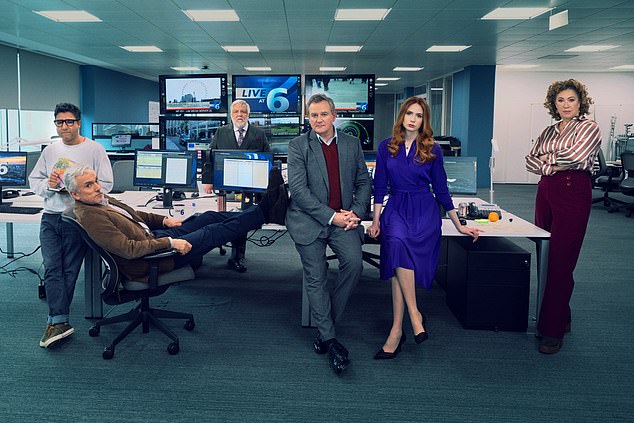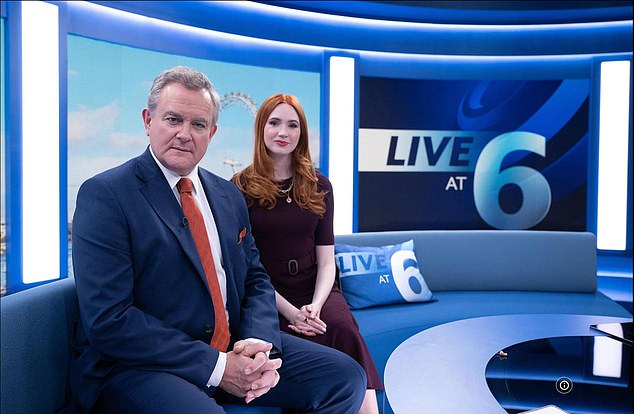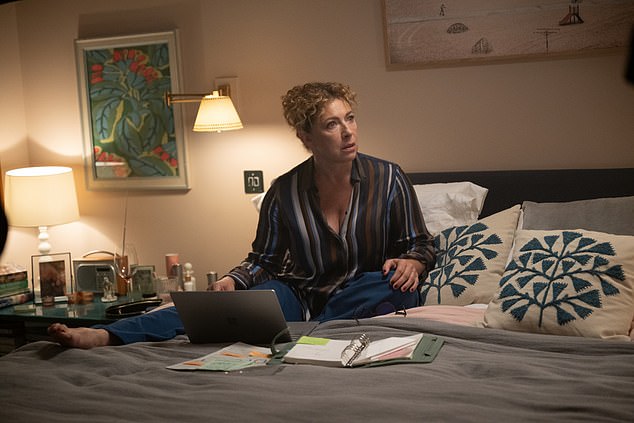Douglas Is Cancelled review: A chilling tale of our woke times as Hugh Bonneville’s gag leaves his life in ruins, writes CHRISTOPHER STEVENS
Douglas is canceled (ITV1)
Never joke. Just don’t do that, ever. It is too dangerous. Woke’s humorless powers will destroy you and every pointless excuse you try will only make things worse.
By the time veteran news presenter Douglas Bellows realizes he’s made an injudicious joke at a family wedding, it’s too late.
The accusation is all over social media, his agent is already preparing to dump him, his employers are going into full ‘damage control mode’ and his career is dead. He’s just not aware of it yet. It doesn’t matter that no one knows what the joke was. Even Douglas (Hugh Bonneville) can’t remember. The whistleblower on Twitter, or X, says it was “extremely sexist” and that’s enough to destroy him.
The consequences could also be catastrophic for his family. Wife Sheila (Alex Kingston) is a newspaper editor whose own reporters are already sharpening the knives for Douglas. Even his 19-year-old daughter Claudia (Madeleine Power) fears she will never be able to talk to him again. Generation Z preaches kindness and tolerance above all else, but this doesn’t extend to actual jokes.
Hugh Bonneville is a limited actor, but his gently wounded personality is ideal for Douglas, a mix of Downton’s Lord Grantham and Paddington’s Mr Brown, writes CHRISTOPHER STEVENS

With the intersecting dialogue and punchlines that follow so quickly, writer Stephen Moffat is able to avoid the pitfall of making his satire too explicit.
Writer Stephen Moffat, best known for Sherlock and Doctor Who, deftly maintains the balance between comedy and social satire in Douglas Is Cancelled (ITV), with a fast-paced script that presents us and its hapless hero with a series of surprises. Bonneville is a limited actor, but his gently wounded persona is ideal for this role, a mix of Downton’s Lord Grantham and Paddington’s Mr Brown.
There is nothing limited about Karen Gillan’s talents. She is electrifying, with a preternatural ability to imply layers of conflicting thoughts and emotions beneath the most innocuous remarks. As Madeline Crow, Douglas’ co-star, she may be his staunchest supporter – or she may be the instigator of the whole scandal, with plans to finish him off.
In one of the first scenes, where she sits chatting with Douglas in the backseat of her chauffeured limousine in the studio parking lot, a hint of flirtation fills the air.
“How do you do that?” her driver asked in surprise. “Create chemistry?” It’s an excellent question: somehow Gillan was able to leave the subliminal impression that they might actually get along better than just a professional rapport on the couch.
But when she returned to her soulless penthouse to find a male friend waiting for her, she threw him out in a fit of apparent disgust for herself and the rest of the world.
She then took to social media and posted an ambiguous message about Douglas: “Don’t believe this. Not my co-host.” Is she saying she refuses to think he’s capable of a sexist joke? Or is she so annoyed that she doesn’t want to work with him anymore?
Up until now, Madeline has been a side character. The most intriguing aspect of the series is watching her shift to the center of attention and reveal who she really is. There’s also a touch of old-school Generation Gap comedy that wouldn’t be out of place in a sitcom 50 years older. Editor Sheila is baffled by her timid assistant Helen (Stephanie Hyam) who wields her own cancellation superpower.
All she has to do is whisper “HR” and her boss wrings her hands. “It’s okay for you to tell me anything you want,” Sheila pleads. “I promise to break eye contact if I ask and will never hold it for more than 30 seconds.”
At home, Sheila is baffled by her daughter’s insistence on leaving the front door wide open. “People can come in, this is for your own safety,” she pleads. ‘For my safety? Does this mean I can’t go outside now?’ Claudia is fuming. “If it’s safe for me to be outside, why isn’t it safe to leave the door open?”
With the intersecting dialogue and fast punchlines, Moffat manages to avoid the pitfall of making his satire too explicit. The sources of inspiration are obvious, especially the downfall of Huw Edwards last year.

Douglas is Canceled was partly inspired by the demise of BBC presenter Huw Edwards last year

There is also a storyline surrounding Douglas’ relationship with his junior colleague Madeline. The question is… did he take inappropriate advantage of her?
Douglas has Edwards’ seriousness, which suits state affairs and ominous news bulletins: “As far as the viewers are concerned,” his producer tells him, “it’s your voice that kills people.”
But there is also an echo of the trivial scandal that ended Alastair Stewart’s tenure at ITN after he quoted an “evil monkey” joke from Shakespeare’s Measure For Measure on Twitter and was accused of racism.
Then there’s Phil-who-shall-not-be-named. You know who I mean. Don’t worry about wedding jokes: has Douglas inappropriately exploited his relationship with a junior colleague… Madeline?
If so, he will notice that he is no longer at the center of the earth.
Sometimes you can dig yourself into a hole so deep that you can never climb out
